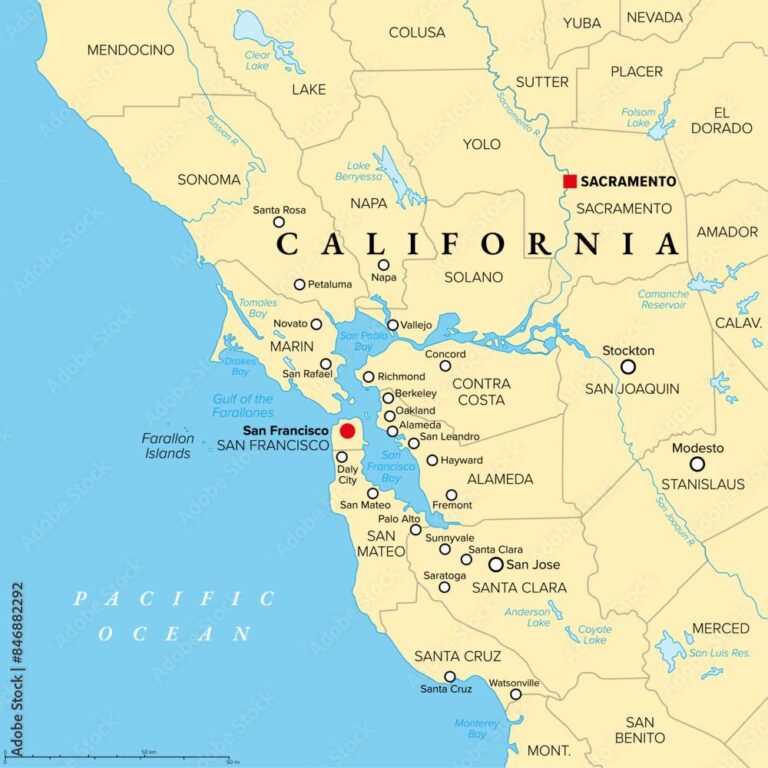Political Evolution in the San Francisco Bay Area: Navigating a New Landscape
Demographic Shifts Reshaping Bay Area Politics
The San Francisco Bay Area, historically a bastion of Democratic dominance, is witnessing a notable transformation in its political fabric. This change is driven by a diverse influx of younger voters, expanding ethnic communities, and professionals from the technology sector whose priorities increasingly diverge from traditional party doctrines. These groups emphasize pragmatic economic policies, the urgent need for affordable housing, and balanced environmental stewardship, challenging the once uniform political identity of the region.
Significant demographic trends influencing this shift include:
- Growth in suburban and exurban populations seeking alternatives to urban-focused governance.
- An expanding cohort of moderate independents disenchanted with partisan stalemates.
- Heightened political activism among marginalized groups advocating for systemic reforms beyond conventional party lines.
| Demographic Segment | Primary Issues | Political Orientation |
|---|---|---|
| Millennial and Gen Z Professionals | Housing Accessibility, Career Innovation | Varied |
| Ethnic and Cultural Minorities | Equity, Educational Opportunities | Progressive |
| Suburban Households | Community Safety, Tax Policies | Moderate to Conservative |
How Progressive Agendas Are Reshaping Democratic Loyalty
The Bay AreaŌĆÖs commitment to progressive reforms has introduced complexities within the Democratic PartyŌĆÖs traditional support base. Initiatives focusing on affordable housing, environmental sustainability, and social justice have energized younger, activist voters but simultaneously caused unease among moderate Democrats and long-term supporters. This evolving dynamic reflects a nuanced realignment where the partyŌĆÖs historical coalition is being tested by ambitious policies prioritizing fairness and ecological responsibility over political convention.
Notable effects on voter engagement and party cohesion include:
- Voter participation shifts: Progressive platforms have mobilized grassroots activism but have also led to decreased enthusiasm among centrists cautious about rapid reforms.
- Internal party debates: Growing ideological divides within local Democratic ranks, focusing on balancing inclusivity with effective governance.
- Electoral challenges: Increased competition from moderate Democrats and occasional Republican contenders appealing to disaffected centrists.
| Policy Area | Support Intensity | Effect on Traditional Voters |
|---|---|---|
| Affordable Housing Initiatives | Strong among progressives | Mixed reactions; concerns over property values |
| Renewable Energy Programs | Broad approval | Generally favorable, with some economic reservations |
| Reforms in Criminal Justice | Wide progressive endorsement | Varied; some law enforcement supporters express apprehension |
Governance Challenges Amid Increasing Political Plurality
Bay Area leaders are confronting unprecedented challenges as the regionŌĆÖs political diversity expands. The once solid Democratic base now contends with growing influence from progressive activists and moderate conservatives alike. This diversification complicates consensus-building on critical issues such as housing, transit, and public safety. Leaders must now navigate a delicate balance between fostering inclusivity and managing entrenched party expectations, all while striving to maintain public confidence.
Officials face a complex array of obstacles, including:
| Challenge | Consequences | Proposed Solutions |
|---|---|---|
| Highly polarized electorate | Slowed policy enactment | Expanded community engagement initiatives |
| Fragmented political coalitions | Reduced alliance effectiveness | Facilitation of bipartisan dialogues |
| Intense media scrutiny | Challenges in public relations | Implementation of transparent communication campaigns |
| Conflicts over resource distribution | Budgetary impasses | Adoption of participatory budgeting models |
Revitalizing Democratic Engagement: Strategies for the Future
To regain traction in the Bay Area, Democratic leaders must adopt a grassroots-focused approach that directly addresses the shifting priorities of their constituents. Prioritizing affordable housing programs, enhancing public transit infrastructure, and expanding mental health services are critical to addressing the regionŌĆÖs escalating cost of living and social welfare challenges. Utilizing community forums and digital engagement tools can foster meaningful dialogue, ensuring policies reflect the lived realities of residents.
Campaigns should also emphasize cultural competence and inclusivity, vital in a diverse urban environment like San Francisco. Building partnerships with local advocacy organizations and championing immigrant rights alongside environmental justice initiatives can rebuild trust and demonstrate responsiveness. The following table highlights key focus areas and actionable tactics to strengthen voter support across targeted communities.
| Focus Area | Neighborhoods of Emphasis | Strategic Actions |
|---|---|---|
| Housing Accessibility | Bayview-Hunters Point, Mission District | Increase housing subsidies, expedite permit approvals |
| Public Transportation | East Bay, Silicon Valley | Boost service frequency, enhance rider safety |
| Mental Health Support | Richmond District, Sunset District | Fund community wellness centers, coordinate care networks |
| Environmental Equity | Oakland, Berkeley | Promote green infrastructure, reduce environmental hazards |
Conclusion: Navigating a New Political Era in the Bay Area
The San Francisco Bay Area stands at a pivotal juncture, with its political landscape undergoing profound change. The evolving voter base and shifting priorities signal a redefinition of regional identity and political alliances. As this transformation unfolds, it will not only influence local governance but may also have ripple effects across CaliforniaŌĆÖs broader political environment. The coming years will be critical in shaping the future trajectory of a region once considered a steadfast Democratic enclave, now embracing new challenges and opportunities.




